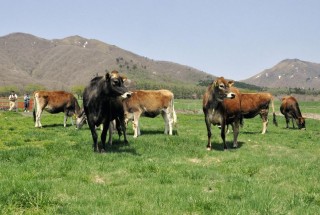Loading
Search
▼ Govt Says Domestic Agriculture To ‘Go On Offensive’ Under TPP
- Category:Other
TOKYO (Jiji Press) — Japan will go on the offensive in the fields of agriculture, forestry and fisheries by taking advantage of the Trans-Pacific Partnership free trade pact, a government white paper on agriculture said Tuesday.
In the paper for fiscal 2015, adopted at the day’s Cabinet meeting, the government emphasized its accomplishments in TPP negotiations.
Japan succeeded in securing tariff removal exceptions for 17.7 percent of all agricultural, forestry and fisheries products, far higher than the average proportion of 1.5 percent among the other TPP participant countries, the annual report said.
The government also noted that Japan was given a long time to reduce its tariffs on five key farm product categories including rice.
In addition, Japan’s exports of beef and other major items that the government aims to promote are expected to increase thanks to planned tariff removal under the TPP.
By implementing policies to shore up producers’ ability to make money, Japan is determined to achieve the transition of its agriculture, forestry and fisheries sectors into industries on the offensive, the white paper said.
Meanwhile, the report noted concerns among producers over an increase in competition with imports and gave explanations about government measures to help stabilize producers’ business.
Regarding the current state of Japan’s agriculture, the white paper said the country’s farmland in 2015 decreased 22,000 hectares from the previous year to 4,496,000 hectares, staying on a gradual downtrend.
While the total number of farmers and entities engaging in agriculture fell around 20 percent from five years ago due to the aging of farmers, incorporated agricultural managers, such as companies and associations, are steadily increasing, according to the white paper.
The government also said there is a need to accelerate structural reforms in the agriculture industry.
At the day’s Cabinet meeting, the government also adopted white papers on fisheries, forestry and dietary education.
The report on fisheries featured the roles of fishing villages in efforts toward sustainable fisheries and indicated a policy to implement measures to boost fishermen’s income.
According to the white paper on forestry, Japan’s lumber self-sufficiency rate in 2014 came to 31.2 percent, recovering 30 percent for the first time in 26 years.
In the paper for fiscal 2015, adopted at the day’s Cabinet meeting, the government emphasized its accomplishments in TPP negotiations.
Japan succeeded in securing tariff removal exceptions for 17.7 percent of all agricultural, forestry and fisheries products, far higher than the average proportion of 1.5 percent among the other TPP participant countries, the annual report said.
The government also noted that Japan was given a long time to reduce its tariffs on five key farm product categories including rice.
In addition, Japan’s exports of beef and other major items that the government aims to promote are expected to increase thanks to planned tariff removal under the TPP.
By implementing policies to shore up producers’ ability to make money, Japan is determined to achieve the transition of its agriculture, forestry and fisheries sectors into industries on the offensive, the white paper said.
Meanwhile, the report noted concerns among producers over an increase in competition with imports and gave explanations about government measures to help stabilize producers’ business.
Regarding the current state of Japan’s agriculture, the white paper said the country’s farmland in 2015 decreased 22,000 hectares from the previous year to 4,496,000 hectares, staying on a gradual downtrend.
While the total number of farmers and entities engaging in agriculture fell around 20 percent from five years ago due to the aging of farmers, incorporated agricultural managers, such as companies and associations, are steadily increasing, according to the white paper.
The government also said there is a need to accelerate structural reforms in the agriculture industry.
At the day’s Cabinet meeting, the government also adopted white papers on fisheries, forestry and dietary education.
The report on fisheries featured the roles of fishing villages in efforts toward sustainable fisheries and indicated a policy to implement measures to boost fishermen’s income.
According to the white paper on forestry, Japan’s lumber self-sufficiency rate in 2014 came to 31.2 percent, recovering 30 percent for the first time in 26 years.
- May 19, 2016
- Comment (0)
- Trackback(0)


